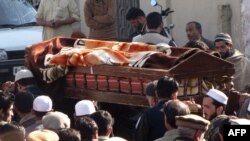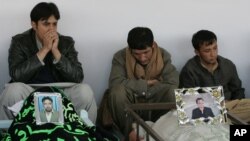Officials in Pakistan's Baluchistan province Friday declared a three-day mourning period, following deadly bomb blasts in the province capital.
Authorities said security forces have been deployed around Quetta where political and religious groups say they will hold protests against the bombings.
The victims' funerals are set to begin Friday.
Police say two suicide bomb blasts Thursday in Quetta in a billiards hall frequented by Shi'ite Muslims killed 82 people.
The billiards hall attack came just hours after another deadly bomb blast in the Quetta market.
A string of bombings across Pakistan Thursday killed 115 people and wounded nearly 250, on one of the nation's deadliest days in years.
The outlawed militant Sunni group Lashkar-e-Jhangvi has claimed responsibility for the Quetta explosions.
Shi'ites make up about 20 percent of Pakistan's mostly Sunni Muslim population of 160 million people.
Ali Dayan Hasan, the Pakistan director of Human Rights Watch, said Friday that Pakistan's Shi'ite Muslims are living in a state of siege and warned sectarian violence is likely to rise. He said "if yesterday's attack is any indication, it's just going to get worse." Four hundred Shi'ites were killed in Pakistan last year.
Authorities said security forces have been deployed around Quetta where political and religious groups say they will hold protests against the bombings.
The victims' funerals are set to begin Friday.
Police say two suicide bomb blasts Thursday in Quetta in a billiards hall frequented by Shi'ite Muslims killed 82 people.
The billiards hall attack came just hours after another deadly bomb blast in the Quetta market.
A string of bombings across Pakistan Thursday killed 115 people and wounded nearly 250, on one of the nation's deadliest days in years.
The outlawed militant Sunni group Lashkar-e-Jhangvi has claimed responsibility for the Quetta explosions.
Shi'ites make up about 20 percent of Pakistan's mostly Sunni Muslim population of 160 million people.
Ali Dayan Hasan, the Pakistan director of Human Rights Watch, said Friday that Pakistan's Shi'ite Muslims are living in a state of siege and warned sectarian violence is likely to rise. He said "if yesterday's attack is any indication, it's just going to get worse." Four hundred Shi'ites were killed in Pakistan last year.

